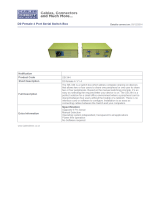
Table of Contents
Electronic Emission
Notices . . . . . . . . . . . . . . . . . . . . . . . . . . . . . . . . . . . . . . . . . . . . . . . . . . . . . . . . . . . . . . . . . . . . . . . . . . . . . . .
iv
Federal Communications Commission
(FCC) Statement............................
iv
Industry Canada Compliance
Statement.. .....................................................
v
German Notice
.............................................................................................
V
Introduction
.........................................................................................................
I
Components
..................................................................................................
1
About the Boards
..........................................................................................
2
Installation Tips
...................................................................................................
3
Memory Map Utility ....................................................................................
5
User Diagnostics ..........................................................................................
6
Installing
PClXe
Boards..
....................................................................................
7
Before you plug in the board.
.....................................................................
7
Plugging in the Board
...................................................................................
9
Software Installation
..................................................................................
IO
l/O
Port Address.. ................................................................................
IO
Memory Window Size and Starting Address
......................................
I2
Interrupt Request Line
(IRQ)
..............................................................
I4
Installing
MClXe
Boards.. .................................................................................
I5
Before you phtg in the board.
...................................................................
I5
Plugging in the Board.. ...............................................................................
17
Configuring the Board................................................................................
18
Software Installation
..................................................................................
20
I/O Port Address
..................................................................................
20
Memory Window Size and Starting Address..
....................................
20
Interrupt Vector (JRQ)
........................................................................
22
Connecting Peripherals
......................................................................................
23
Comtecting
to a Modem
.............................................................................
23
DB-9 Equipped Boards
.......................................................................
23
DB-25 Equipped Boards
.....................................................................
24
RJ-45 Equipped Boards.. .....................................................................
25
ALTPIN Modem Wiring (RJ-45
Versions)..................................
26
Contents
i




















